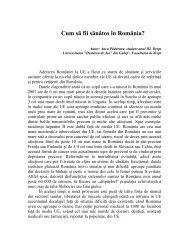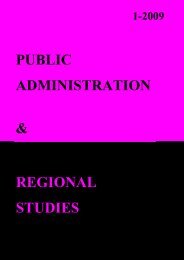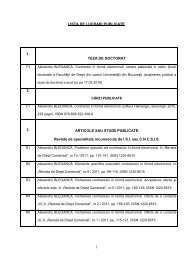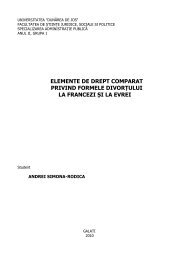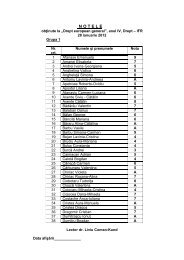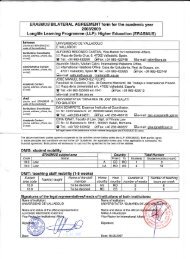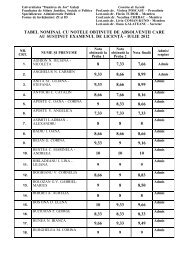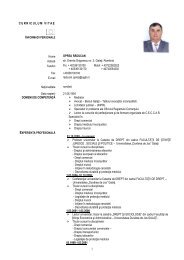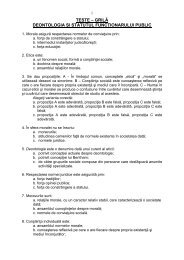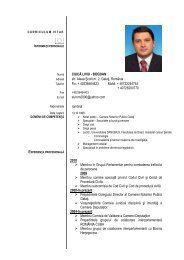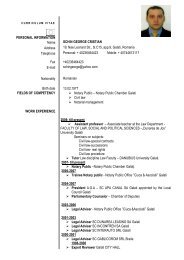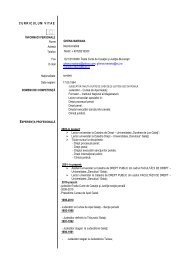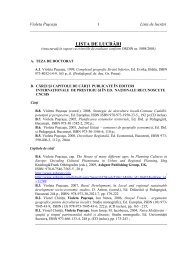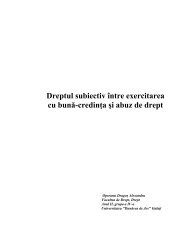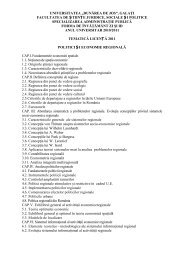conference program - Facultatea de Drept - Dunarea de Jos
conference program - Facultatea de Drept - Dunarea de Jos
conference program - Facultatea de Drept - Dunarea de Jos
Create successful ePaper yourself
Turn your PDF publications into a flip-book with our unique Google optimized e-Paper software.
LEGAL EDUCATION VOCABULARYLecturer Ph.D. in progress Onorina GRECUSpiru Haret University, ConstantaFaculty Of Law And Public AdministrationAbstractLegal education is the education of individuals who intend to become legal professionals or thosewho simply intend to use their law <strong>de</strong>gree to some end, either related to law (such as politics or aca<strong>de</strong>mic) orbusiness. It inclu<strong>de</strong>s: first <strong>de</strong>grees in law, which may be studied at either un<strong>de</strong>rgraduate or graduate level<strong>de</strong>pending on the country, vocational courses which prospective lawyers are required to pass in somecountries before they may enter practice, and higher aca<strong>de</strong>mic <strong>de</strong>grees.The law school <strong>program</strong> is divi<strong>de</strong>d following the European standards for university studies (Bolognaprocess): first a license <strong>program</strong> - three-year period, then a Master of law <strong>program</strong> - two-year period, an<strong>de</strong>ventually, for those who are interested in aca<strong>de</strong>mic careers, there is the third <strong>program</strong> of doctorate studies -three-year period.Legal English is now a distinctive field of language instruction within the overall ESP disciplinesand assuming an increasingly high profile in Law <strong>de</strong>gree <strong>program</strong>mes across European universities,particularly among those of EU member states.While intercultural differences may pose little number of issues in Business English or be evenunimportant in Technical English instruction, they are of major importance to Legal English. The teachermust raise the stu<strong>de</strong>nts’ awareness of intercultural aspects, such as different sources of law when two legalsystems are involved, different juridical culture, different legal institutions.Nouns “lawyer” and “attorney” and “barrister” and “solicitor” as well are legal culture-boundterms. The common sense of the term “attorney” – “avocat” is very well known, as in “attorney-at-law”, theoriginal meaning as that of a person who acts in name and on behalf of someone on its request is somehowforgot. Thus, when one acts in his/her own behalf, we can say that he or she is “his own attorney”. In thisvery situation, “attorney” must be translated by “mandatar”, “reprezentant” or “împuternicit”. The term“lawyer” represents, at origin, any person who owns a law school diploma; it should be translated, in thislarger sense, as “jurist”. We could, as well, for this very term to use the expression “om <strong>de</strong> drept”. If both“lawyer” and “attorney” may be translated as “avocat”, one must remember that “lawyer” does notintrinsically mean “attorney”, after all one is a lawyer before being an attorney, representing or counselingclients.GALAŢI, 24 th -25 th of April 2009 35



